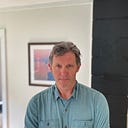Member-only story
Wim Hoff’s Ten-Week Program: Whys and Whats.
I had been watching Wim Hoff and his “movement” for a year or more before he rolled out his on-line course. Frankly, I had been suspicious of the whole thing, partly because of the very enthusiastic nature of many of the participants —it had a kind of cultish feel, and the promises made were, I felt, immodest.
In addition to this, many of the actual feats that Wim had achieved — climbing Everest in a pair of shorts, staying immersed in ice for two hours, running the Mojave with no water, etc., seemed kind of like circus acts, freak show items that probably didn’t have to do with sustainable human health and well-being. Also, I suspected deep down that this thing so many people are doing — looking for immortality, endless improvement — is misguided, possibly manic, and ill-advised. Although I kind of do it too.
Part of what was appealing, admittedly, was the challenge: Most of human history has been a catalogue of ways in which we humans innovate to make our lives easier. Creatures are all creatures of comfort. The snag has usually been that comfort is not a limitless commodity. There are only so many hours of sunshine to bask in; one only finds a bees’ nest full of honey occassionally. But for us Westerners — and many Easterners and Southerners today as well — life is easier than it has ever been. Having to brave the elements has become a matter of choice, not necessity…
